

The Lhasa Apso is a small breed of dog that originates in Tibet, where they were bred by monastery monks to act in a sentinel role, and alert the monks to any intruders! They have a known history going back over 4,000 years, and are descended from a small breed of mountain wolf, despite their cuddly and cute appearance! They are now known to be one of the breeds of dog extant today that are most closely related genetically to their lupine ancestors! They were first introduced to the UK in the early 1900’s, after being brought home by returning soldiers who had served on the Indian subcontinent and received the dogs as a gift.
Today, they are a popular and attractive pet dog breed, with a long, sleek and beautiful coat that makes them very much in demand as companions and lap dogs. If you are considering buying or adopting a Lhasa Apso dog or puppy, it is of course important to do your research first. Read on to learn more about the general temperament, trainability and health of the Lhasa Apso.
The Lhasa Apso is an excellent companion dog that very much enjoys the company of their owners, bonds closely with them and loves attention. Because they were traditionally bred as indoor dogs, they also fit well into smaller homes and apartments, needing a moderate amount of daily exercise but not requiring long, energetic walks.
They are alert and territorial within the home, retaining the sentinel traits that they were originally bred for as monastery dogs. They are not apt to bark or make a lot of noise without good reason, but they are quick to bark if they wish to alert you to something and get your attention. Their bark is deep and resonant, and often comes as a surprise to the first time Lhasa Apso owner, due to the small size of the dog!
Because they have very long fur, this does require a significant amount of attention, and usually, daily brushing. Their fur can be prone to knotting and matting up if not correctly cared for, and also has a tendency to pick up dirt and muck when out on walks, and sometimes, hang into their food and water bowls! The facial hair of the dog is also long, and may obstruct the eyes; this will necessitate it being trimmed or held back to allow the dog to see properly!
Despite their very long hair, they do not shed particularly heavily. Their coats are double-layered, and once a year they will shed the bottom layer of the coat, while the top layer of longer hair does not generally shed around the house in any great quantities.
The Lhasa Apso enjoys plenty of attention from their owners, and can live happily within a family situation as long as enough time is devoted to them! They can be naturally rather wary or strangers and visitors, but correct introductions and socialisation should be able to surmount this.
The Lhasa Apso is a medium intelligence dog, meaning that they are generally fairly good to train, as they are both bright enough to understand what you want but not so bright as to already be ten steps ahead of you! They are not classed as a working dog breed, so basic commands and maybe a couple of extra skills or tricks are the norm for training the Lhasa Apso, and they respond well to positive reinforcement training with treats as a prize!
As is often the case with smaller dog breeds, there is sometimes the tendency to overlook the fact that they are dogs and not babies, and let them get away with things that a larger dog would not be permitted to do! It is important to avoid allowing the dog to get into bad habits, and to treat them as a real dog with wolf ancestry, and not as a child!
The Lhasa Apso is one of the most robust, healthy and long lived pedigree dog breeds over all, and it is not uncommon to hear of Lhasa Apso’s living into their 20’s! However, the generally accepted average lifespan of the dog is 14 years, which still puts them ahead of the pack in terms of equivalents to dogs of a similar size.
There are a few health conditions that the Lhasa Apso is slightly more prone to than other breeds, including sebaceous adenitis, a skin disorder that is hereditary and related to several other dog breeds too, including the Poodle. The Lhasa Apso also sometimes has various problems with the eyes and vision, including a propensity to cataracts in old age, cherry eye, and dry-eye syndrome.
Another eye condition that is present within the Lhasa Apso gene pool is progressive retinal atrophy, or PRA, which progressively leads to blindness. The condition cannot be treated or cured, but it is recommended that Lhasa Apso breeders have their dog’s eyes checked annually to ensure that they are clear of the condition and so, less likely to pass it on to their offspring.
Copyright © 2005-2016 Pet Information All Rights Reserved
Contact us: www162date@outlook.com